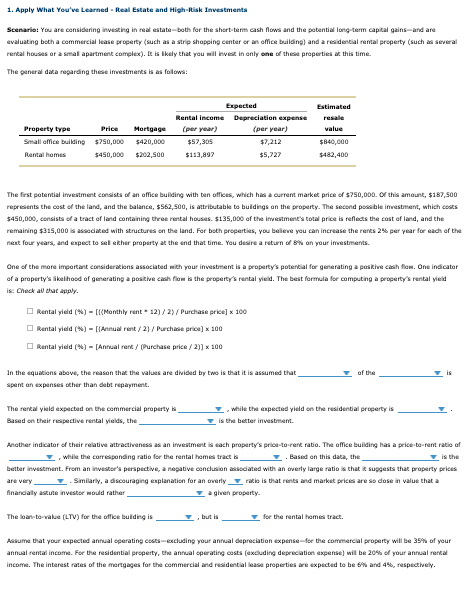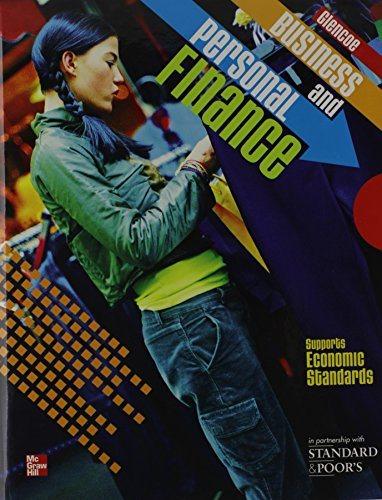Question
1st blank options- half, one third, one quarter, 200% 2nd blank options- rental income, purchase price 3rd blank options- 4.58%, 3.05%, 3.82%, 2.29% 4th blank

1st blank options- half, one third, one quarter, 200%
2nd blank options- rental income, purchase price
3rd blank options- 4.58%, 3.05%, 3.82%, 2.29%
4th blank options- 17.71%, 15.18%, 12.65%, 10.12%
5th blank options- office building, rental homes tract
6th blank options- 6.58, 13.08, 7.85, 103.99
7th blank options- 78.57, 6.58, 3.95, 7.85
8th blank options- office building, rental homes tract
9th blank options- low, high
10th blank options- Large, small
11th blank options- purchase than rent, rent than purchase
12th blank options- 0.4500, 0.5600, 0.9333, 0.2700
13th blank options- 0.9333, 0.2700, 0.4500, 0.5600
1. Apply What You've Learned - Real Estate and High-Risk Investments Scenario: You are considering investing in real estate-both for the short-term cash flows and the potential long-term capital gains and are evaluating both a commercial lease property (such as a strip shopping center or an office building) and a residential rental property (such as several rental houses or a small apartment complex). It is likely that you will invest in only one of these properties at this time. The general data regarding these investments is as follows: Property type Price Mortgage Small office building $750,000 $420,000 Rental homes $450,000 $202,500 Expected Rental income Depreciation expense (per year) (per year) $57,305 $7,212 $113,897 $5,727 Estimated resale value $340,000 $482,400 The first potential investment consists of an office building with ten offices, which has a current market price of $750,000 of this amount, $187,500 represents the cost of the land, and the balance, $562,500, is attributable to buildings on the property. The second possible investment, which costs $450,000, consists of a tract of land containing three rental houses. $135,000 of the investment's total price is reflects the cost of land, and the remaining $315,000 is associated with structures on the land. For both properties, you believe you can increase the rents 2% per year for each of the next four years, and expect to selekher property at the end that time. You desire a return of 8% in your investments. One of the more important considerations associated with your investment is a property's potential for generating a positive cash flow. One indicator of a property's likelihood of generating a positive cash flow is the property's rental yield. The best formula for computing a property's rental yield is: Check at the analy Rental yield (9) - (Monthly rent 12/2)/Purchase price] x 100 Rental yield (%) - [[Annual rent/2)/ Purchase price] X 100 Rental yield (%) - Annual rent Purchase price / 2)] x 100 of the In the equations above, the reason that the values are divided by two is that it is assumed that spent on expenses other than debt repayment. The rentalyield expected on the commercial property is Based on their respective rental yields, the while the expected yield on the residential property is is the better investment Another indicator of their relative attractiveness as an investment is each property's price-to-rent ratio. The office building has a price-to-rent ratio of While the corresponding ratio for the rental homes tract is . Based on this data, the is the better investment. From an investor's perspective, a negative conclusion associated with an overty large ratio is that it supgests that property prices are very Similarly, a discouraging explanation for an overly ratio is that rents and market prices are so dose in value that a financially astute investor would rather a given property. The loan-to-value (LTV) for the office buiding is .but is for the rental homes tract. Assume that your expected annual operating costs-excluding your annual depreciation expense for the commercial property will be 35% of your annual rental income for the residential property, the annual operating costs (excluding depreciation expertise) wil be 20% of your annual rental income. The interest rates of the mortgages for the commercial and residential lease properties are expected to be 5% and 4%, respectively. 1. Apply What You've Learned - Real Estate and High-Risk Investments Scenario: You are considering investing in real estate-both for the short-term cash flows and the potential long-term capital gains and are evaluating both a commercial lease property (such as a strip shopping center or an office building) and a residential rental property (such as several rental houses or a small apartment complex). It is likely that you will invest in only one of these properties at this time. The general data regarding these investments is as follows: Property type Price Mortgage Small office building $750,000 $420,000 Rental homes $450,000 $202,500 Expected Rental income Depreciation expense (per year) (per year) $57,305 $7,212 $113,897 $5,727 Estimated resale value $340,000 $482,400 The first potential investment consists of an office building with ten offices, which has a current market price of $750,000 of this amount, $187,500 represents the cost of the land, and the balance, $562,500, is attributable to buildings on the property. The second possible investment, which costs $450,000, consists of a tract of land containing three rental houses. $135,000 of the investment's total price is reflects the cost of land, and the remaining $315,000 is associated with structures on the land. For both properties, you believe you can increase the rents 2% per year for each of the next four years, and expect to selekher property at the end that time. You desire a return of 8% in your investments. One of the more important considerations associated with your investment is a property's potential for generating a positive cash flow. One indicator of a property's likelihood of generating a positive cash flow is the property's rental yield. The best formula for computing a property's rental yield is: Check at the analy Rental yield (9) - (Monthly rent 12/2)/Purchase price] x 100 Rental yield (%) - [[Annual rent/2)/ Purchase price] X 100 Rental yield (%) - Annual rent Purchase price / 2)] x 100 of the In the equations above, the reason that the values are divided by two is that it is assumed that spent on expenses other than debt repayment. The rentalyield expected on the commercial property is Based on their respective rental yields, the while the expected yield on the residential property is is the better investment Another indicator of their relative attractiveness as an investment is each property's price-to-rent ratio. The office building has a price-to-rent ratio of While the corresponding ratio for the rental homes tract is . Based on this data, the is the better investment. From an investor's perspective, a negative conclusion associated with an overty large ratio is that it supgests that property prices are very Similarly, a discouraging explanation for an overly ratio is that rents and market prices are so dose in value that a financially astute investor would rather a given property. The loan-to-value (LTV) for the office buiding is .but is for the rental homes tract. Assume that your expected annual operating costs-excluding your annual depreciation expense for the commercial property will be 35% of your annual rental income for the residential property, the annual operating costs (excluding depreciation expertise) wil be 20% of your annual rental income. The interest rates of the mortgages for the commercial and residential lease properties are expected to be 5% and 4%, respectivelyStep by Step Solution
There are 3 Steps involved in it
Step: 1

Get Instant Access to Expert-Tailored Solutions
See step-by-step solutions with expert insights and AI powered tools for academic success
Step: 2

Step: 3

Ace Your Homework with AI
Get the answers you need in no time with our AI-driven, step-by-step assistance
Get Started


